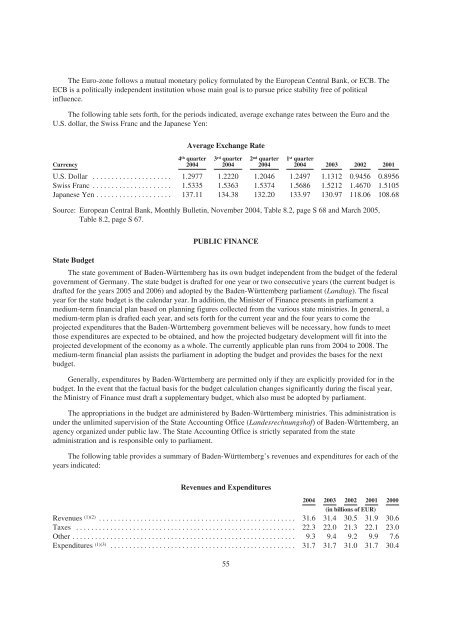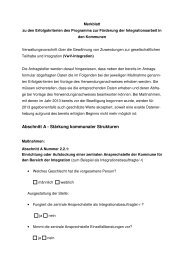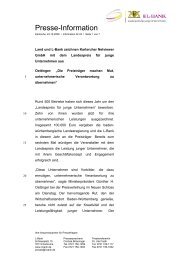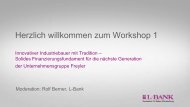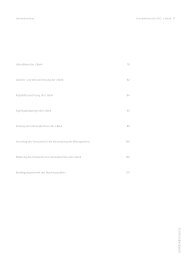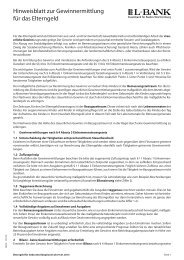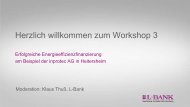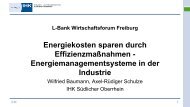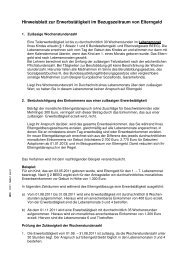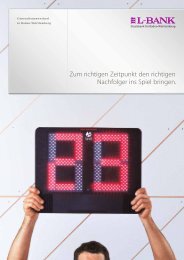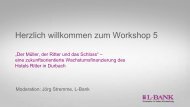Landeskreditbank Baden-Württemberg - L-Bank
Landeskreditbank Baden-Württemberg - L-Bank
Landeskreditbank Baden-Württemberg - L-Bank
Create successful ePaper yourself
Turn your PDF publications into a flip-book with our unique Google optimized e-Paper software.
The Euro-zone follows a mutual monetary policy formulated by the European Central <strong>Bank</strong>, or ECB. The<br />
ECB is a politically independent institution whose main goal is to pursue price stability free of political<br />
influence.<br />
The following table sets forth, for the periods indicated, average exchange rates between the Euro and the<br />
U.S. dollar, the Swiss Franc and the Japanese Yen:<br />
Currency<br />
Average Exchange Rate<br />
4 th quarter<br />
2004<br />
3 rd quarter<br />
2004<br />
2 nd quarter<br />
2004<br />
1 st quarter<br />
2004 2003 2002 2001<br />
U.S. Dollar ..................... 1.2977 1.2220 1.2046 1.2497 1.1312 0.9456 0.8956<br />
Swiss Franc ..................... 1.5335 1.5363 1.5374 1.5686 1.5212 1.4670 1.5105<br />
Japanese Yen .................... 137.11 134.38 132.20 133.97 130.97 118.06 108.68<br />
Source: European Central <strong>Bank</strong>, Monthly Bulletin, November 2004, Table 8.2, page S 68 and March 2005,<br />
Table 8.2, page S 67.<br />
PUBLIC FINANCE<br />
State Budget<br />
The state government of <strong>Baden</strong>-Württemberg has its own budget independent from the budget of the federal<br />
government of Germany. The state budget is drafted for one year or two consecutive years (the current budget is<br />
drafted for the years 2005 and 2006) and adopted by the <strong>Baden</strong>-Württemberg parliament (Landtag). The fiscal<br />
year for the state budget is the calendar year. In addition, the Minister of Finance presents in parliament a<br />
medium-term financial plan based on planning figures collected from the various state ministries. In general, a<br />
medium-term plan is drafted each year, and sets forth for the current year and the four years to come the<br />
projected expenditures that the <strong>Baden</strong>-Württemberg government believes will be necessary, how funds to meet<br />
those expenditures are expected to be obtained, and how the projected budgetary development will fit into the<br />
projected development of the economy as a whole. The currently applicable plan runs from 2004 to 2008. The<br />
medium-term financial plan assists the parliament in adopting the budget and provides the bases for the next<br />
budget.<br />
Generally, expenditures by <strong>Baden</strong>-Württemberg are permitted only if they are explicitly provided for in the<br />
budget. In the event that the factual basis for the budget calculation changes significantly during the fiscal year,<br />
the Ministry of Finance must draft a supplementary budget, which also must be adopted by parliament.<br />
The appropriations in the budget are administered by <strong>Baden</strong>-Württemberg ministries. This administration is<br />
under the unlimited supervision of the State Accounting Office (Landesrechnungshof) of <strong>Baden</strong>-Württemberg, an<br />
agency organized under public law. The State Accounting Office is strictly separated from the state<br />
administration and is responsible only to parliament.<br />
The following table provides a summary of <strong>Baden</strong>-Württemberg’s revenues and expenditures for each of the<br />
years indicated:<br />
Revenues and Expenditures<br />
2004 2003 2002 2001 2000<br />
(in billions of EUR)<br />
Revenues (1)(2) .................................................... 31.6 31.4 30.5 31.9 30.6<br />
Taxes .......................................................... 22.3 22.0 21.3 22.1 23.0<br />
Other ........................................................... 9.3 9.4 9.2 9.9 7.6<br />
Expenditures (1)(3) ................................................. 31.7 31.7 31.0 31.7 30.4<br />
55


